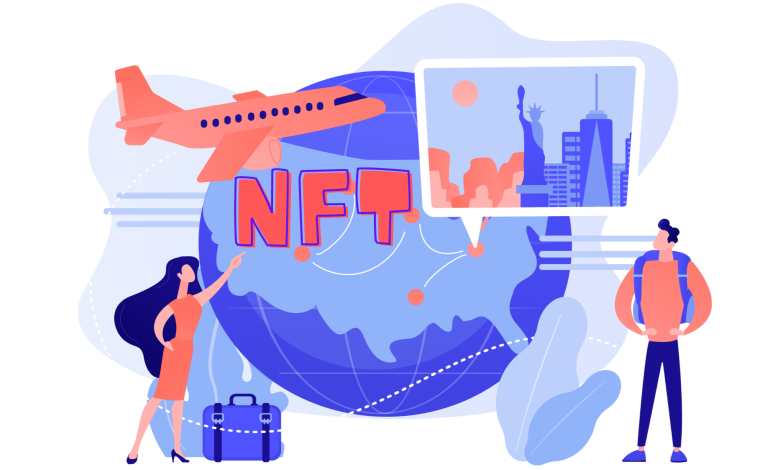NFT in the Travel Industry: An Ultimate Guide

We all know non-fungible tokens (NFTs) are already overwhelmed by the worlds of art, music, gaming, fashion, and food. Now, it’s time for travel and tourism. The travel industry, including hotels, airlines, restaurants, and entertainment venues, is being disrupted by an emerging trend called NFT travel marketing and promotional opportunities.
What are NFTs?
A non-fungible token (NFT) is a unique digital asset that only exists on the blockchain and cannot be copied. Each NFT is essentially a cryptographic token that stands in for a particular digital object. This then makes it possible to sell digital information, such as artwork, pictures, audio files, and movies, as one-of-a-kind items. Using the example of art, it can be demonstrated that tangible art may be sold to consumers and that an artist’s original creations can be highly valuable. As a result of the ease with which digital files may be copied, this has historically been challenging to replicate with digital art. Due to the complete uniqueness of each NFT, they offer a remedy for this.
An NFT varies from other cryptographic assets, like cryptocurrencies, in that it cannot be traded for an equivalent value, which is referred to as being “non-fungible” in the description of these tokens. In the developing field of NFT technology to accomplish marketing objectives.
NFT marketplace and the Metaverse
It’s crucial to comprehend how NFTs can fit into the idea of the metaverse before delving further into the subject of the NFT travel marketplace. The building of virtual environments where social interactions take place, frequently aided by virtual reality, augmented reality, or related technology, could be summed up simply as the metaverse.The concept of the metaverse is being experimented with by numerous travel and tourism businesses by providing users with virtual spaces to share, hosting online trade shows or business meetings, or joining pre-existing metaverse virtual worlds. NFTs can also be useful in this situation by enabling the sale of in-game goods or virtual property.
NFTs become a marketing tool for the travel industry.
The majority of early NFT transactions revolved around the sale of collectible digital goods, including original works of art, music files, and even celebrity Tweets. However, the NFT craze has grown beyond this over time, and this growth has led to the marketing of NFTs with practical uses. The travel industry is well-positioned to benefit from both the functional and collectible NFT categories. The sale of NFTs can make news for companies, promote creativity and brand values, and act as promotional goods. But NFT technology can also power client loyalty programmes, premium club memberships, and other things.
Partnerships and collaborations
Partnering with established or up-and-coming digital art markers is one of the finest methods for individuals working in the travel business, including the hotel industry, to benefit from the best NFT marketing. As a result, original digital artwork may be produced, which may then be sold or given away in contests. This typically proceeds as an NFT travel marketing strategy as follows: The company gets in touch with an artist and asks him to make a piece of art for them, usually with the idea of travelling or using a particular marketing strategy as inspiration.The firm then sells or gives the NFT away in an effort to attract media attention after the artist has finished creating the artwork.
Build a client rewards program.
Customer loyalty programs powered by NFT have been among the most innovative NFT applications to date. They are already widely used in the travel industry to reward loyal customers and those who recommend friends and family. However, managing all of this data can be difficult. Individual customers may be given an NFT in place of this, which holds their customer records. Consequently, each customer’s entry is unique, and the relevant data is securely saved.The digital file that the customer receives can subsequently be used to make reservations at hotels or restaurants or redeem rewards after making a purchase.
Novel ownership models and NFT-based fundraising
Creating new ownership models or fundraising strategies based on NFT technology is the subject of an intriguing new prospect for NFT travel. Hotels, cafes, and restaurants, for instance, might decide to sell some of their real estate and sell an NFT to symbolically and legally record ownership. Companies might decide to offer a number of NFT shares, enabling residents to have a connection to the property and a stake in its success. Alternatively, the sale of other NFT material could be utilised as a way to raise money rapidly, which can be crucial for businesses like hotels, eateries, and airlines.
Blockchain technology and NFT travel marketing
Although blockchain technology and the idea of NFT travel marketing are closely intertwined, senior individuals in the travel industry need to be aware that blockchain technology has other applications. Blockchain can be utilised for safe transactions, client loyalty programmes, and check-in identification services.
Digital travel industry trends
The likelihood of NFT travel is increasing. One of the most important digital developments to be aware of is the usage of non-fungible tokens for marketing and customer relationship management. Additional instances include the usage of retinal and fingerprint scanning, the purchase of robots, and the application of artificial intelligence.
Conclusion
NFT travel marketing is still in its early stages, but it is anticipated to become more common as NFT technology and its use cases develop. NFTs can be used to administer client loyalty programs, offer exclusive memberships, and offer travel-related goods and services in addition to their collectible aspect.




